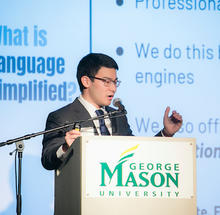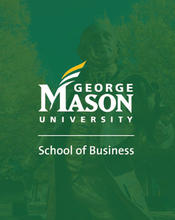- June 6, 2023
Understanding the mysterious resistance to remote work has been a defining theme of Management Professor Kevin Rockmann's research since 2004.
- June 2, 2023
The George Mason University School of Business celebrated 1,157 graduates, 832 undergraduate students, 219 graduate students, and 106 certificates, at a special ceremony on Saturday, May 20 at EagleBank Arena.
- April 20, 2023
Fifteen teams competed for $40K in prizes at the George Mason University School of Business Patriot Pitch Competition during the in-person April 13 event on Mason’s Fairfax Campus.
- March 28, 2023
There’s no one-size-fits-all solution to growing a franchise business. But stock market reactions to companies’ strategic moves can give you more than a clue.
- March 8, 2023
An explosion of digital technology made today’s hybrid workplace possible, but it couldn’t upgrade the analog infrastructure that is the human brain.
- December 19, 2022
School of Business deans, faculty, and staff wrote an article for AACSB Insights on how business schools can help universities, students, and other stakeholders navigate the ongoing unbundling of higher education.
- January 31, 2023
Research by Mason Accounting Professor Bret Johnson, a former SEC staff accountant and academic fellow, shows how seemingly mundane intra-agency policies can have unintended effects that benefit Wall Street over Main Street.
- September 26, 2022
Jingyuan Yang, an assistant professor of information systems and operations management at Mason's School of Business, is at the forefront of AI research that aims to crack the codes of the physical world. Her results so far point toward innovative solutions for some of the biggest societal, governmental, and business challenges we face.
- September 22, 2022
Exceptions may prove the rule, but they must first be explained. That is why finance researchers are drawn to the distress anomaly-- a well-documented phenomenon that challenges the risk-return paradigm in equity markets. Generally, higher-risk investments are expected to yield higher returns than safer, more stable securities. In recent years, however, studies have shown that high-credit-risk securities for companies in distress – i.e. when their already-low credit rating is being downgraded -- realize abnormally low returns compared to non-distressed securities of the same or lower risk. Academics have proposed a range of rationales for this puzzle. Alexander Philipov, finance area chair and associate professor at George Mason University, says they mainly fall into two categories.
- August 24, 2022
While most students were taking a break from their studies this summer, the student managers of Patriot Real Estate Funds raised $1.25 million for the second student-managed real estate investment fund at George Mason University. The Center for Real Estate Entrepreneurship (CREE) at the School of Business established the initial student-managed real estate investment fund in 2018 to provide students of the Masters in Real Estate Development (MRED) program a unique experiential learning opportunity. With real money raised from outside investors, this is one of only a few similar programs offered at universities across the country, and allows students the chance to study, recommend, and manage investments in commercial real estate properties in the metropolitan Washington, D.C. area.










